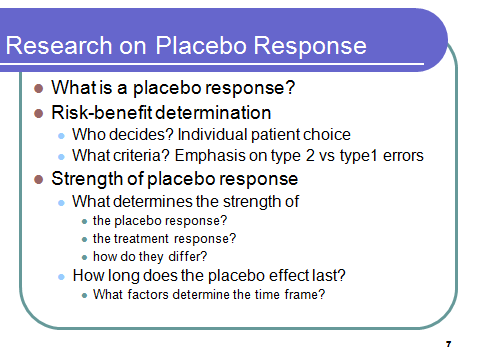|
Perry Cohen, Ph.D. presents Sham Neurosurgical Procedures in Clinical Trials: Patient Activists’ Perspectives at the NIH conference
Sham Neurosurgical Procedures in Clinical Trials for Neurodegenerative Diseases: Scientific and Ethical Considerations
held on June 30 and July 1, 2010
Page 1 - 2 - 3 - 4 - 5 - 6 - 7 - 8 - 9 - 10 - 11 - 12 - 13

Research on Placebo Effects
Recent research and thinking on placebo response for a number of CNS conditions including PD indicate that it is a conditioned reaction to the social context of the delivery of a treatment – a result of expectations for a reward, based on trust and authority of the source and reinforced by medical ritual and recognition of the experimental subject. So even if the placebo intervention is inert as assumed the social context is not.
Risk-Benefit Determination
All medical therapy involves risk- benefit tradeoffs. The issues are what are criteria for assessments? For whom and by who are they made? In a patient-centered system these choices are taken individually and are supported by providing the patient with scientifically valid information and counseling from a trustworthy clinical expert.
Risks for advanced PWP are measured against our current substantial and increasing suffering and disability, so we are more concerned about delayed or denied access to helpful therapy. The experimental scientific model emphasizes avoidance of type 1 errors (false positives) at the expense allowing type 2 errors (false negatives) which are mathematically inversely related (win-lose). Advanced PWP, who are willing to take extra calculated risks, are frustrated by good options being closed or delayed. So who is being protected by reliance on sham procedures? The patients’ interest in avoiding false negatives should be weighted at least equally with the Scientific/regulatory perspective that is built in to the analysis to avoid false positives.
Strength of the Placebo Effect
Sham brain surgery as a placebo control is no sugar pill: It involves significant medical intervention and risk, elaborate ritual, extended deception, as well as recognition from being studied and thus has a powerful impact as observed in many studies
We know that all chronic disease has a strong psychological component, especially CNS conditions, so expectations, mood, and spirit can and do benefit patients clinically.
We know that different people respond differently to placebo effects, just as different people respond differently to treatments. [For example, nearly 90% of PWP benefit from DBS which includes placebo effects, but we don’t know how much of the response to DBS is a result of treatment versus placebo response.]
Data from sham groups in trials indicate that high proportions of PWP improve in control groups in contrast with expected decreases in functioning from progression for usual care. This suggests that sham brain surgery has a major effect on the disease. From a patient perspective attempts to minimize this placebo response dilutes the treatment and takes away the meaning from the comparison between treatment and control.
We don't know precisely how long the placebo effect lasts, but we know it can last a year or more and we know it goes away quickly when unblinded. Tom Intili has testified that sham surgery and unblinding may have negative psychological consequences. We need to know more about who responds and under what circumstances for both placebo effects and treatments.
Slide 8 -- Interaction Effects
Sham controlled trials assume that purely psychological effects from patient expectations and the biochemical effects of introducing an active intervention are distinguishable independent variables, and they can be added or subtracted validly. This assumption may be close to being accurate for sugar pill placeboes, but is it true for the more powerful effect from placebo brain surgery?
Go Back Go Forward
Page 1 - 2 - 3 - 4 - 5 - 6 - 7 - 8 - 9 - 10 - 11 - 12 - 13
|
